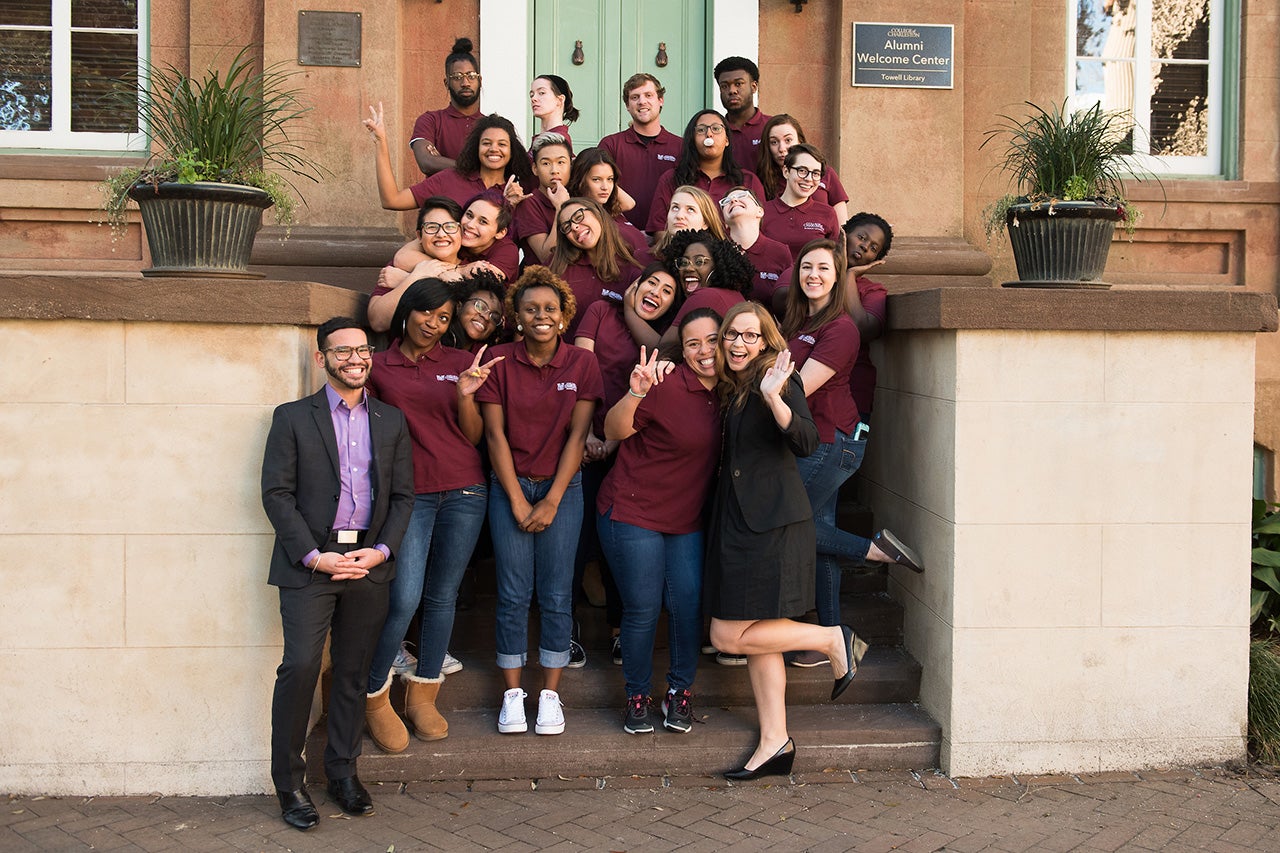One of Stephanie Visser‘s most prized possessions in her director’s office at the Center for Civic Engagement in the Lightsey Center is her Bonner Founder’s Award that sits on top of a file cabinet right beside her door. She received the light-green–colored bowl, handmade in Berea, Ky. (Berea College had the first Bonner Program), in 2015 for starting the program, which provides scholarship money and volunteer opportunities for a diverse array of students, at CofC.
“It’s a constant reminder to myself to continue to be bold and take chances,” says Visser ’07 (M.P.A.), sitting in her office that overlooks Calhoun Street. “You never know the ripple effect of positive change that can come from your ‘yes.’”
More than 80,000 ripples, in fact. That’s the amount of hours Bonner Leaders have volunteered over the last decade. It’s even more astounding when you consider the fact that we’re talking about just 75 students since the founding of the program, which is celebrating its 10th anniversary.
“Bonner was my first baby,” says the mother of two. “I put my heart and soul into it. It was so important to me that the College have a place on this campus for a diverse group of students who are intentionally committed to their community, intentionally committed to each other and intentionally committed to social justice and diversity.”

Corella and Bertram Bonner, namesakes of the Bonner Leaders Program, started their higher education and service program in 1990.
The program came about when two students, Jyn Repede ’09 and Jamilla Harper ’08, attended the 2008 IMPACT National Conference, an annual symposium to increase college student service and civic engagement. After being moved by a speaker from the Bonner Foundation, they made it their mission to bring the program to the College. But it wasn’t long before Harper graduated, Repede went to study abroad and the task to actually make it happen fell to Visser and her junior intern, Heather Crouch ’10.
“What I loved about it and what I still love doing is training people to think beyond the initial level of service and how you can have a sustainable impact,” says Crouch, now the volunteer coordinator at SKIP, Supporting Kids in Peru, in the northern coastal city of Trujillo. “It’s really exciting to see how it’s grown.”
With $10,000 in seed money from the Bonner Foundation, Visser has grown the program from just a few students and no scholarship money that first year to about 28 students and graduated-level scholarship grants. Although each Bonner must do 10-15 hours a week of service, Bonner isn’t just students volunteering; it’s planning and attending conferences, it’s academic advising, it’s group support, it’s creating a family and a network.
“Bonners are the self-motivated movers and shakers on campus, with leadership roles as RAs, orientation interns, peer facilitators, teaching fellows and Greek life members, to name a few,” says Domenico Ruggerio, the Center for Civic Engagement’s associate director who handles much of the day-to-day duties of the program. “In creating community and senses of belonging on campus, Bonners apply what they learn in the curriculum to help drive social change through high-impact direct service, education and advocacy and community engagement.”
And not just in Charleston. Bonners do service work across the nation and around the world, most all of it paid for with donations and grant money. Freshman and sophomore Bonners travel domestically, while juniors and seniors travel internationally. Since its inception, that’s amounted to six cities across the country, one U.S. territory and five countries, leading to more than 6,000 service hours with 40 partners. For many Bonners, these trips represent their first time abroad or even their first time on a plane.
Molliana Walker ’13, now a medical student at the Medical University of South Carolina, will never forget her service trip to Morocco over winter break her senior year. “We all came back together to process our experiences, listen and encourage each other,” she recalls. “As we entered into a new year,
I remember thinking back to how awkward we all were at our first orientation years before and how much we had grown. Bonner is a huge commitment with tremendous reward. It will push you far outside your comfort zone, immerse you in the true Charleston community that most CofC students never see and highlight the technicolor on issues and ideas that once seemed so black and white.”
Of course, making a difference – both in the community and in the individual – is what Bonner is ultimately about. “It’s really helped build a culture of service on our campus,” says Visser. “That’s one of the things I’m most proud of: We’ve shown that doing good is also doing good for our students and for our campus. “And it becomes a life commitment,” she adds. “It changes their whole career path. Just think about what we as a society all gain. They’re going to be better citizens for the rest of their lives.
“Their capacity to give, their capacity to understand the social problems in the community their living in, their capacity to work with diverse teams, their capacity to be empathetic, their capacity to be decision makers: All of those things start here and they stay with them. That’s a pretty amazing legacy for the College
of Charleston.”
Featured image: Domenico Ruggerio [lower left] and Stephanie Visser ’07 (M.E.S.) [lower right] with the 2017-18 Bonner Leaders.




